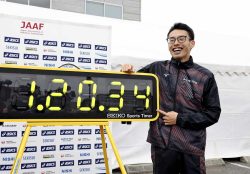
A Honda Motor Co. building
16:10 JST, May 30, 2022
Honda Motor Co. will develop artificial intelligence technology to detect abnormalities in a driver’s physical condition by analyzing how the vehicle is traveling and any subtle changes in the driver.
The technology is expected to reduce accidents involving elderly drivers, which have become a social problem, and also to help detect dementia or glaucoma at an early stage. The automaker aims to put it to practical use around 2030.
Working with the National Institutes for Quantum Science and Technology, Honda uses magnetic resonance imaging (MRI) and sensors to analyze a driver’s brain and eye movements. The technology is designed to identify the cause of errors that lead to accidents, using a camera to detect the driver’s line of sight and warn them about overlooking pedestrians crossing streets.
By applying this technology, Honda will develop a function that signals a decline in cognitive function or spatial perception when its sensor detects the car veering or getting close to other vehicles. On top of this, Honda will combine AI with the sensor and camera to analyze the driver’s physical condition and any suspected illness.

If a car detects a delay in a driver’s response to traffic lights, it will notify them that they may have narrow vision. Narrow vision is a common symptom of glaucoma, but the disease usually progresses slowly and is difficult to recognize. This function is aimed at notifying drivers of the risk of accidents and also serves as an opportunity for them to realize something is wrong before symptoms of the disease become obvious.
As one in four driver’s license holders are over 65 years old, reducing the number of accidents caused by older drivers has become an issue. The development of this technology could make drivers aware of a decline in their abilities, which may lead them to stop driving or surrender their licenses.
Automakers are storing and analyzing daily driving data to make use of it for safe driving, amid fierce competition to develop technologies.
Toyota Motor Corp. has equipped some of its models with an AI system that detects abnormalities by capturing a driver’s gaze, the direction of their face and how open their eyelids are. An alarm goes off or a seatbelt vibrates if the system detects the drivers looking away from the road or looking sleepy.
Mazda Motor Corp. has developed a system that uses a camera and sensor to detect drivers’ drowsiness and any sudden illness, and slow down or stop the vehicle if necessary. It aims to install the system in new models starting this year.
Honda’s new technology aims to detect anomalies much earlier.
“Various data is stored in cars, and we want to detect risks and make use of them for safety technology,” a Honda spokesperson said.
Top Articles in Business
-

Prudential Life Insurance Plans to Fully Compensate for Damages Caused by Fraudulent Actions Without Waiting for Third-Party Committee Review
-

Narita Airport, Startup in Japan Demonstrate Machine to Compress Clothes for Tourists to Prevent People from Abandoning Suitcases
-

JR Tokai, Shizuoka Pref. Agree on Water Resources for Maglev Train Construction
-

KDDI Opens AI Data Center at Former Sharp Plant in Osaka Prefecture; Facility Will Provide Google’s Gemini AI Model for Domestic Users
-

Toyota Motor Group Firm to Sell Clean Energy Greenhouses for Strawberries
JN ACCESS RANKING
-

Japan Institute to Use Domestic Commercial Optical Lattice Clock to Set Japan Standard Time
-

Israeli Ambassador to Japan Speaks about Japan’s Role in the Reconstruction of Gaza
-

Man Infected with Measles May Have Come in Contact with Many People in Tokyo, Went to Store, Restaurant Around When Symptoms Emerged
-

Prudential Life Insurance Plans to Fully Compensate for Damages Caused by Fraudulent Actions Without Waiting for Third-Party Committee Review
-

Woman with Measles Visited Hospital in Tokyo Multiple Times Before Being Diagnosed with Disease























